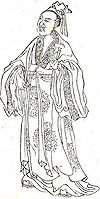Wang Xizhi
| Names | |
|---|---|

| |
| Chinese: | 王羲之 |
| Pinyin: | Wáng Xīzhī |
| Wade-Giles: | Wang Hsi-chih |
| Zi: | Yìshào (逸少) |
| Hao: | Dànzhāi (澹斋) |
| Also known as: | Shūshèng (書聖, literally Sage of Calligraphy) |
- This is a Chinese name; the family name is 王 (Wang).
Wang Xizhi (Chinese: 王羲之, 303–361) was a Chinese calligrapher, traditionally referred to as the Sage of Calligraphy (書聖).
Born in Linyi, Shandong, he spent most of his life in the present-day Shaoxing, Zhejiang. He learned the art of calligraphy from Wei Shuo. He excelled in every script but particularly in the semi-cursive script. Unfortunately, none of his original works remains today.
His most famous work is the Preface to the Poems Composed at the Orchid Pavilion, the preface of a collection of poems written by a number of poets when gathering at Lanting near the town of Shaoxing for the Spring Purification Festival. The original is lost, but there are a number of fine tracing copies and rubbings. Wikisource has the text with translation.
Wang Xizhi is particularly remembered for one of his hobbies - rearing geese. Legend has it that he learnt the key of how to turn his wrist while writing by observing how the geese move their necks.
Wang Xizhi had seven children, all of whom were notable calligraphers. The most distinguished one was his youngest son, Wang Xianzhi.
ReferencesISBN links support NWE through referral fees
- Li, Siyong, "Wang Xizhi". Encyclopedia of China (Chinese Literature Edition), 1st ed.
External links
zh-classical:王羲之 ((credits|Wang_Xizhi|144629213}}

